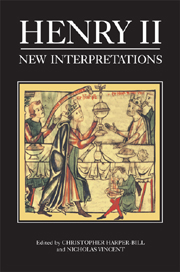Book contents
- Frontmatter
- Contents
- List of Illustrations
- Editor's Preface
- List of Abbreviations
- Introduction: Henry II and the Historians
- The Accession of Henry II
- Henry II and Louis VII
- Doing Homage to the King of France
- Henry, Duke of the Normans (1149/50–1189)
- Henry II and England's Insular Neighbours
- Henry II, the English Church and the Papacy, 1154–76
- On the Instruction of a Prince: The Upbringing of Henry, the Young King
- Henry II and the Creation of the English Common Law
- Finance and the Economy in the Reign of Henry II
- Henry II and the English Coinage
- The Court of Henry II
- Literary Culture at the Court of Henry II
- Henry II and Arthurian Legend
- Index
On the Instruction of a Prince: The Upbringing of Henry, the Young King
Published online by Cambridge University Press: 12 September 2012
- Frontmatter
- Contents
- List of Illustrations
- Editor's Preface
- List of Abbreviations
- Introduction: Henry II and the Historians
- The Accession of Henry II
- Henry II and Louis VII
- Doing Homage to the King of France
- Henry, Duke of the Normans (1149/50–1189)
- Henry II and England's Insular Neighbours
- Henry II, the English Church and the Papacy, 1154–76
- On the Instruction of a Prince: The Upbringing of Henry, the Young King
- Henry II and the Creation of the English Common Law
- Finance and the Economy in the Reign of Henry II
- Henry II and the English Coinage
- The Court of Henry II
- Literary Culture at the Court of Henry II
- Henry II and Arthurian Legend
- Index
Summary
Few figures played such a central role in the world of Henry II as his son Henry, the Young King. From the death of his older brother William on 2 December 1156, he was Henry II's principal heir, the object of his father's deep affection and the linchpin of his dynastic schemes. The only post-Conquest English king to be crowned in the lifetime of his father, young Henry's coronation in 1170 precipitated the final stages of the Becket crisis and led, though perhaps by no means inevitably, to the most acute crisis of Henry II's reign, the great war of 1173–4. In 1183, the Young King's support for a major rebellion in Aquitaine came close to wresting the duchy from his younger brother Richard — a situation arguably far more serious for Richard than John's rebellion in 1193–4 — and in his efforts to support his younger son, Henry II twice came within an inch of losing his life when arrows were shot at him from the walls of Limoges. But although the Young King's death from fever at Martel on 11 June 1183 led to the collapse of the revolt, his political legacy continued to prove injurious. As John Gillingham has suggested, Richard's inability to quell the revolt of 1183 may have seriously undermined his father's belief in his ability to hold down the duchy, while it was Henry's deeply rooted fear that Richard would seek to supplant him, as the Young King had tried to do in 1173–4, that led the old king to the fatal policy of refusing formally to recognize Richard as his heir.
- Type
- Chapter
- Information
- Henry IINew Interpretations, pp. 184 - 214Publisher: Boydell & BrewerPrint publication year: 2007



